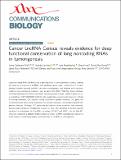Cancer LncRNA Census reveals evidence for deep functional conservation of long noncoding RNAs in tumorigenesis
Author(s)
Carlevaro-Fita, Joana; Lanzós, Andrés; Feuerbach, Lars; Hong, Chen; Mas-Ponte, David; Pedersen, Jakob Skou; Johnson, Rory; Kellis, Manolis; PCAWG Drivers and Functional Interpretation Group; ... Show more Show less
DownloadPublished version (1.226Mb)
Open Access Policy
Open Access Policy
Creative Commons Attribution-Noncommercial-Share Alike
Terms of use
Metadata
Show full item recordAbstract
Long non-coding RNAs (lncRNAs) are a growing focus of cancer genomics studies, creating the need for a resource of lncRNAs with validated cancer roles. Furthermore, it remains debated whether mutated lncRNAs can drive tumorigenesis, and whether such functions could be conserved during evolution. Here, as part of the ICGC/TCGA Pan-Cancer Analysis of Whole Genomes (PCAWG) Consortium, we introduce the Cancer LncRNA Census (CLC), a compilation of 122 GENCODE lncRNAs with causal roles in cancer phenotypes. In contrast to existing databases, CLC requires strong functional or genetic evidence. CLC genes are enriched amongst driver genes predicted from somatic mutations, and display characteristic genomic features. Strikingly, CLC genes are enriched for driver mutations from unbiased, genome-wide transposon-mutagenesis screens in mice. We identified 10 tumour-causing mutations in orthologues of 8 lncRNAs, including LINC-PINT and NEAT1, but not MALAT1. Thus CLC represents a dataset of high-confidence cancer lncRNAs. Mutagenesis maps are a novel means for identifying deeply-conserved roles of lncRNAs in tumorigenesis.
Date issued
2020-02Department
Massachusetts Institute of Technology. Department of Electrical Engineering and Computer Science; Massachusetts Institute of Technology. Computer Science and Artificial Intelligence LaboratoryJournal
Communications Biology
Publisher
Springer Science and Business Media LLC
Citation
Carlevaro-Fita, Joana et al. "Cancer LncRNA Census reveals evidence for deep functional conservation of long noncoding RNAs in tumorigenesis." Communications Biology 3, 1 (February 2020): 56 © 2020 The Author(s)
Version: Final published version
ISSN
2399-3642